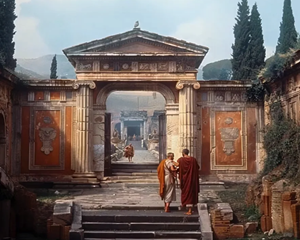Team member Julian Schilliger, 29, a computer scientist in Basel, Switzerland, worked on how to digitally "unroll" the scroll, whose layers were visible in thousands of cross sections of the 3D scan.
團隊成員朱利安·席利格29歲,是一個來自瑞士巴塞爾的計算機科學家,他致力于用數字化的方式“展開”卷軸,卷軸層在3D掃描的數千個橫截面中是可見的。
Individual layers had to be traced through the cross sections and digitally "flattened" -- its own labor-intensive procedure.
單獨的層必須通過橫截面來描繪,然后經過數字化“壓平”處理--這本身就是一個勞動密集型的過程。
Schilliger developed a method using AI to help automate the process.
席利格開發了一種使用人工智能來自動化處理這個過程的方法。
He created a model that identified which points in the scan were adjacent on segments of the scroll layers.
他創建了一個模型,可以識別掃描圖中的哪些點在卷軸層的段落上是相鄰的。
"That was like a big aha moment for everyone, that you can do it automatically," he says.
他說:“這就像一個驚喜時刻,你可以自動完成。”
Enthralled papyrologists determined the columns the team revealed are part of a meditation on pleasure, likely written by Philodemus.
欣喜若狂的紙莎草學家們認定,該團隊展示的幾列文本是對于愉悅的一段思考,很可能是由菲洛德默斯所寫。
One fragment reads, "in the case of food, we do not right away believe things that are scarce to be absolutely more pleasant than those which are abundant."
其中一段話寫道:“對于食物而言,我們不會立即相信稀缺的東西絕對比那些富足的東西更令人愉悅。”

As the challenge nears the end of its second year, organizers have set new goals: to read 90 percent of four scrolls, up from 5 percent of one scroll in 2023, and to scale up the techniques pioneered in the first year.
隨著挑戰賽的第二年接近尾聲,組織方設定了新的目標:從2023年的一卷軸的5%上升到四卷軸的90%,并擴大第一年率先采用的技術。
Increased automation will be crucial to reading the roughly 300 intact scrolls, and perhaps thousands more.
提高自動化程度對于閱讀大約300卷完整的卷軸至關重要,也許還有數千卷。
"I absolutely believe that this problem will be solved and we'll be scanning these things and pressing a button, and 90 percent of it will just, boom, come out," Seales says.
“我非常相信這個問題會得到解決,我們會掃描這些東西,按下一個按鈕,90%的東西就會砰地一聲出來,”西爾斯說。
The progress so far has thrilled the classics world and left scholars eager to learn what more these recovered relics might have to say.
目前所取得的進展讓古典學界感到興奮,學者們急切地想知道這些復原的遺跡還有什么要說的。
"When we were first shown the text that AI had revealed, it was a moment of utter astonishment," says Robert Fowler, chair of the Herculaneum Society in Oxford, England, which supports conservation of the villa site.
英國牛津赫庫蘭尼姆協會主席羅伯特·福勒說:“當我們第一次看到人工智能展示的文本時,這簡直是一個讓人大開眼界的時刻。
"The ability to do this now and to reach across the millennia and dip into not just a single book but a library... it's connecting with eternity."
現在能夠做到這一點,能夠跨越千年時光,瀏覽一本書乃至一整個圖書館...這是與永恒相連。”












